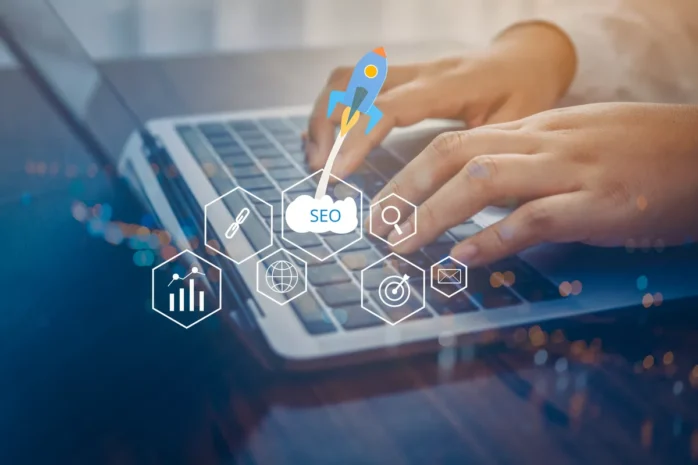
Are you worried that using AI tools on your website might affect your standing in search engine results? It’s a common concern for many website owners: the possibility of being penalized in rankings when embracing ChatGPT and other AI for tasks like content creation or SEO optimization.
In this guide, we’re going to tackle this concern head-on. We’ll take a close look at the array of AI tools available, discuss how they’re used, and whether it’s likely their use will cause an issue for you in the rankings. Whether you’re well-versed in digital marketing or just starting to dip your toes into the vast ocean of website management, this article aims to demystify the myths and lay out the facts.

Common AI Tools and Their Uses
There are a variety of AI tools available now, ranking from the basic ChatGPT interface available to everyone to sophisticated automated content generators that can draft full articles and blog posts. There are also tools that claim to be able to analyze and optimize website content for better search engine performance.
There are potential benefits to using some of these AI tools. For starters, they can significantly streamline the content creation process, generating drafts at a speed no human can match. This efficiency doesn’t just save time, it also allows for more frequent content updates, which is a key factor in maintaining a strong online presence. In the old days, content was always considered king in part because it was so time-consuming to create. Just having the resources to create it could give you an advantage compared to the competition. Now, almost anyone can create content quickly thanks to AI. (More on that below.)
In SEO, AI tools can also be used to perform labor-intensive tasks in bulk. Some website plug-ins, for example, have now integrated AI features that will help you automatically generate meta descriptions and page summaries that are unique across the website, to save you and your team time.

The Limitations of AI
At launch when we were testing AI tools, we often chuckled at the frequent reminder that ChatGPT gave us that it was “only an AI language model” when we asked it something out of bounds. But, it’s true that it’s very important when using any AI tool to understand how it’s been trained and what its limitations might be, especially if you’re trying to rank your website in search.
Lack of Content Originality, Creativity, and Expertise
One of the primary limitations of AI is its lack of originality and creativity in content creation. While AI tools are able to generate content very quickly, they lack the ability to produce truly unique and innovative ideas. This can result in content that, while technically sound, may lack the depth and personal touch that resonates with human readers.
This is crucial to understand from an SEO perspective. Google prioritizes original and high-quality content, and AI-generated content can sometimes fall short in these areas. Google has stated that it will rank helpful content no matter how it was generated, but if you’re just using raw output from ChatGPT, it’s very unlikely to be helpful to users.

Limited Understanding of Nuance and Context
AI tools also still struggle with understanding the nuances of human language and context. This can lead to content or SEO strategies that miss the mark in terms of relevance or tone. For instance, AI may not fully grasp the subtle differences in keyword usage for different audiences or industries, leading to less effective SEO strategies. Again, remember that Google wants to rank content that is helpful. A human will be much better equipped to write something helpful than an AI language model will be. You should also be aware that AI tools will never interpret your data or develop strategies as well as an SEO agency.
Limited Data and Reliance on Algorithms
AI’s effectiveness is heavily reliant on the data it is fed and the algorithms it uses. If the input data is biased, outdated, or limited, the output from AI tools will reflect these shortcomings. This is particularly crucial in SEO, where outdated or incorrect data can lead to strategies that are ineffective or even detrimental to a website’s ranking.
Potential for Overreliance and Reduced Human Oversight
There’s a risk of becoming over-reliant on AI tools, which can lead to reduced human oversight. While AI can handle many tasks efficiently, the critical eye and judgment of a human are indispensable, especially in content creation and SEO strategy. Overreliance on AI can result in overlooking errors or missing out on opportunities that require human intuition and experience.

How to Balance AI and Human Output
All that said, it is possible to use AI for your website without incurring the wrath of the Google gods. It can be safe to use AI. The key here is to balance AI and human output, applying your expertise to what the tools give you to make sure that it’s still helpful.
Our #1 piece of advice here is to never use raw AI output for any content that will be read by your human visitors. You should take the time to polish it, add your expertise, and improve it. Again, this is because AI tools often produce content that may lack the nuanced understanding and depth that human writers bring. This can lead to content that, though technically accurate, doesn’t engage readers on a deeper level or reflect the unique voice of the brand.
Will Google Penalize You for Using AI Output?
Google has stated they will reward helpful content no matter how it was generated. So, if you’re able to prompt your AI in such a way that it’s legitimately helpful for users, then it should be safe for you to use that output. Just keep in mind that even if Google can’t detect AI, it’s very possible that your visitors will. So, take the time to apply your expertise to AI output before putting it on your website.











